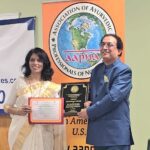Author:Dr. Kiran Kumari, Assistant Professor,Department of Sociology and Social Anthropology, Punjabi University, Patiala. Coordinated by Dr Jaswant Singh Puri, Recipient of Doctor of Letters (HC) and Punjab Ratan
India
healthysoch
Chandigarh, December 29, 2021 :

In the present paper an attempt has been made to explore the psycho-social implications of visual impairment and the factors which contribute significantly in the personality formation, self-identity and self-confidence. Visual impairment is one of the most distressing conditions and it needs various kinds of adjustments to overcome its implication. Visual impairment can be congenital or acquired at any time in life. It influences almost all the aspects of person’s life i.e. education, employment, communication etc,.
The findings of the study revealed that those visually impaired persons who faced negative behaviour, dejection and lack of rehabilitative opportunities are more prone to psycho-social problems as compared to those who do not face any kind of negative behaviour, supported, are exposed early to rehabilitative measures and are fully accepted in the family and community.


It had also been found that visually impaired persons, who received sufficient amount of family support, were socially integrated and well adjusted in life and are less prone to psycho-social problems. Hence, it can be concluded that social isolation, attitude of people, lack of communication, less recreational activities and lack of family interaction and support are the major factors which generate the feelings of loneliness , stress and lack of satisfaction among the respondents.
Thus, the present study stress the need for social support and more accessible opportunities of communication, education, employment and rehabilitation to visually impaired persons.
Historicaly visually impaired have been viewed as inferior. Often they are perceived as people who are helpless, resentful, bitter, and unhappy. In literature, blind characters are often depicted either as cursed individuals or people with supernatural powers. Many are detectives who are not brilliant because of their knowledge but because of a sixth sense and magic that blind people have (Jernigan 1999). Hallahan and Kauffman (1991) have described that in ancient times blindness was considered as a punishment for sins, either one’s own or one’s ancestors. Sisay (1996) has also indicated that blind people are perceived as hopeless, miserable beggars and one who deserves pity as well as sympathy, one who is to be compensated for loss of vision. In addition, Arega (1999) argues that society looks at disabilities in general as being caused by evil spirit, God wrath, punishment for sin and curses by somebody.
It is in this context some have advocated that blindness itself does not create emotional disturbance, instead, it is the societal prejudice that causes emotional distress. People who are blind concurred that the misconceptions others have about blindness, and not the loss of vision or the need for adaptive skills, is what causes anxiety (Cutsforth, 1951; Jernigan, 1969).
Blind and visually impaired person, thus, face several challenges which makes them prone to powerlessness, inability to participate in decision making and development programmes that affect them and their fundamental rights.Consequently, this marginlisation make them more prone to psycho-social problems. But many researchers have also reported that with support from the family and community many educated visually impaired persons are accepting their disability, becoming self-confident, have higher self-esteem and wider social networks.
In the present paper an attempt has been made to investigate the psycho-social problems faced by persons with visual impairment and what are the factors which contribute in overcoming these challenges and making them self-reliant, self-confident and have higher self-esteem.
Objectives
The main objective of this study is to explore the psycho-social problems of persons with visual impairment and the factors which contribute in becoming them more confident and and persons with high self-esteem.
Methodology
A simple random sample of 200 educated visually impaired persons with varying degrees of impairment in the age range of 20- 45 years both male and female was selected from the five special institutions of Punjab and U.T. Chandigarh namely Institution for the Blind, Amritsar; Vocational Rehabilitation Training Center, Ludhiana; Government Institute for the Blind, Jamalpur (Ludhiana); Institute for the Blind, Chandigarh; National Association for the Blind, Chandigarh. For the present study, a structured interview schedule was used to collect data.
Results:
Acceptance of Visual Impairment
Acceptance of one’s disability (Sneadand and Davis, 2002) is necessary for successful rehabilitation. Acceptance of the situation helps the visually impaired person to reconcile himself/herself to living with his impairment.
In fact acceptance brings him/her to the threshold of exploring ways and means to see how best he/she can carry on living without feeling utterly helpless and frustrated. In fact, blindness is the most feared affliction, because sight is viewed as the most important sense (Wagner & Oliver, 1994). It has been found that loss of vision affects the sufferer physically as well as mentally.
Problem of acceptance occurs mainly with those who lose their sight after birth. Researchers have also reported that adventitious blind is severely affected by the problem of acceptance than the congenital blind. Adventitiously visually impaired is a person who was blessed with a gift of sight earlier and has now been rendered blind due to medical or some other reasons, has to undergo a traumatic phase of life. Factors such as educational opportunities, degree of usable vision, and expectations of family and friends can powerfully shape a blind person’s attitudes toward, and acceptance of, blindness (Roy and MacKay, 2002; Schroeder, 1996). An attempt has been made to procure the views of respondents regarding the acceptance of visual impairment.
healthysoch







